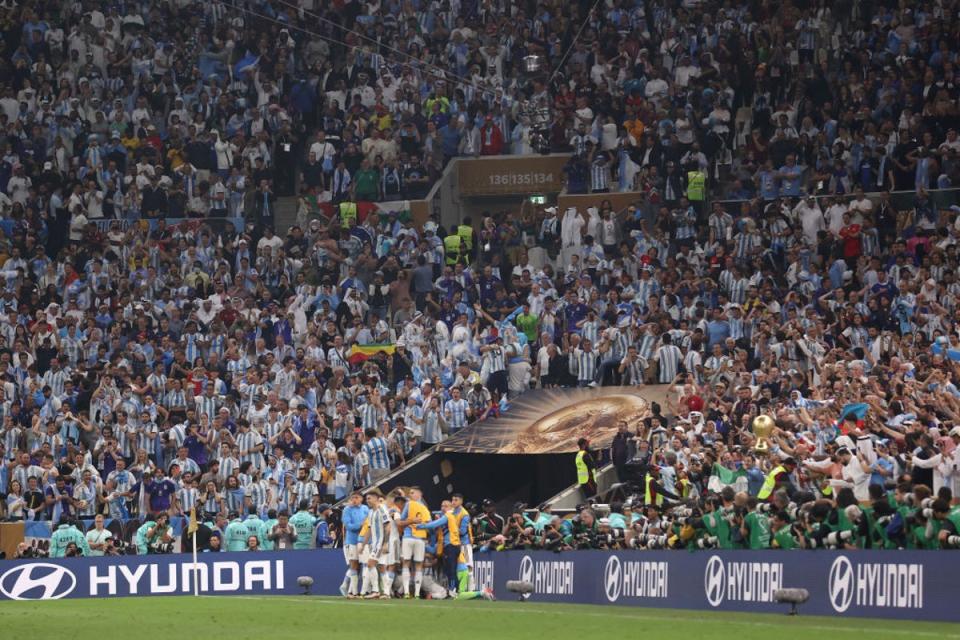Why Argentina won this penalty shootout before it even began
- Oops!Something went wrong.Please try again later.
- Oops!Something went wrong.Please try again later.
- Oops!Something went wrong.Please try again later.
The noise was deafening, and with each step it got louder. The brave French players who trod the lonely walk to the penalty spot were met by a wall of whistles and boos, and yet it was more than that: this was an animalistic howl of a noise, a piercing shriek which compelled the French to take notice, to feel the fury in the air.
Kylian Mbappe ignored it – he had scored two penalties and a hat-trick already and he wasn’t about to miss now: 1-0. It rained down on Kingsley Coman like a storm, and it didn’t stop until he was repelled by the hands of Emi Martinez. 1-1. Then came Aurelien Tchouameni, and your stomach tightened for a 22-year-old in his first World Cup, because there was no empathy where he was going.
When he got there, Martinez embarked on some prime sh**housery, flinging the ball in the other direction to stretch out the moment, or perhaps to assert his power. He dived the wrong way but Tchouameni was rattled and missed the target. 2-1. The screech beat down on Randal Kolo Muani, but he held his nerve. 3-2. But then the rage melted away and it turned to hope. Gonzalo Montiel strode forwards, rolled the ball into the bottom corner, and it was done.
Nobody remembers the entirety of a World Cup final, even if they witnessed it in flesh and bone; as soon the final whistle blows it’s impossible to relocate every ebb and flow of the game in our mind.
Instead we’re left with a kaleidoscope of stills: Angel Di Maria twisting Ousmane Dembele into crisis; Nicolas Otamendi clattering into the legs of Kolo Muani; Mbappe wheeling away; Messi’s arms aloft; Mbappe wheeling away all over again. Then came Martinez’s save, and Montiel’s goal.
In the hours before kick-off, the hot air had crackled with anticipation. The road out of Doha to Lusail choked with traffic and the state-of-the-art metro-rail ground to a halt under the weight of thousands flooding to the stadium, and to the giant fan park a couple of stops apart. This World Cup still needed its definitive game, its enduring image, and surely over the course of this fantasy final – Argentina vs France, Messi vs Mbappe – they were going to get it. As it turned out, they got every image they could possibly have imagined.
But the turning point, the moment you knew this was going to be Argentina’s trophy, was none of those. At the end of extra time Hugo Lloris won the coin toss and he chose for France take the first penalty. It was the statistically sound choice; the team shooting first wins more often than they lose.
But it meant Messi got to select the end at which they took them, and he chose Argentinian wrath. As soon as the crowd at that end understood, their response was triumphant, and as Lloris walked to his spot along the byline he may have considered that this was something of an oversight.
Four hours earlier, the extent of the disparity in support of the two teams quickly became clear. Thousands of Argentina fans had come to witness history making this a home match in everything but geography. There was barely a French shirt or tricolor flag in sight: not along the Lusail Boulevard supposedly designed upon the Champs-Elysees, nor along the wide gangways around this giant soup bowl of a stadium.
Inside there were a few thousand France fans behind one goal, but the rest of the stadium was filled with the stripes of Argentina, broken up only by the occasional bright white cluster of men wearing the traditional thawb.
It was clear that the stadium was more than a venue – it was a vessel of support for Argentina, a cauldron in which to realise Messi’s destiny. Argentina came here with a defeat on their record, with a tricky penalty shootout against the Dutch navigated, an altogether choppier ride than the French.

But they had enormous will, and to use a football cliche – oddly for a World Cup final – it felt for much of this game as if they wanted it more.
Their motivation wasn’t to win Argentina’s third World Cup, but to win Messi’s first, his only. When they won the 2021 Copa America after so many failures, Angel Di Maria had scored the winning goal and Martinez had made crucial saves, but as soon as the whistle blew it was Messi they all ran to.
Perhaps there was some desperation in that: this was a nation which hadn’t always appreciated Messi but which came to understand what it has; what it had.
And so it wasn’t that Argentina didn’t want to lose, so much as they simply couldn’t. There were times here when it felt as if they would, when Mbappe’s second goal rippled the net and the breath was sucked out of them, on the pitch and in the stands. Or when the referee pointed to the spot in extra time and the stadium fell to its quietest all night, fans struck by shock.
But before the shootout began, as the referee signalled towards the goal surrounded by Argentinian flags, they knew at that moment it was done.

